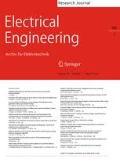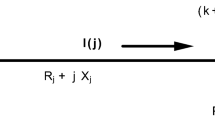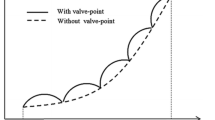Abstract
In the present paper, the optimum generation scheduling problem of deregulated power system is solved considering the non-smooth and non-convex generator fuel cost characteristics using the clustered adaptive teaching–learning-based optimization (CATLBO) technique. In CATLBO technique, the entire class is separated into many sections and assigned different teacher to each section depending on the performance of that particular section. This sectioning of the class makes proposed algorithm less prone to trapping in local optima and more robust. In this paper, three different objective functions are formulated, and they are total generation cost minimization considering the practical constraints, system loss minimization and L-index/ voltage stability enhancement index (VSEI). In this optimization problem, the generator active power outputs, generator bus voltage magnitudes, transformer tap ratios and bus shunt susceptances are selected as the control variables including the various equality and inequality constraints. The effectiveness and suitability of the proposed algorithm is examined on standard IEEE 30 bus, 57 bus, 118 bus and 300 bus systems, and the simulation results obtained using the proposed algorithm are also compared with many other optimization techniques reported in the literature.




Similar content being viewed by others
Abbreviations
- \(a_{i}\), \(b_{i}\), \(c_{i}\) :
-
Fuel cost coefficients of ith thermal generator
- \(d_i\), \(e_i\) :
-
Generator cost coefficients considering the valve point loading (VPL) effects
- \(G_{ij}\), \(B_{ij}\) :
-
Transfer conductance and susceptance between buses i and j
- n :
-
Total number of buses
- \(N_\mathrm{G}\) :
-
Total number of generators
- \(N_\mathrm{T}\) :
-
Number of transformers
- \(N_{\mathrm{sh}}\) :
-
Number of shunts
- \(P_{Gi}\) :
-
Scheduled power output from the ith generator (in MWs)
- \(P_{Di}\) :
-
Active power demand
- \(Q_{Di}\) :
-
Reactive power demand
- \(V_{Di}\) :
-
Load bus voltage magnitude
- \(V_{i}\), \(V_{j}\) :
-
Voltage magnitudes at bus i and bus j
- \(z_i\) :
-
Number of prohibited operating zones (POZs) of ith generating unit
- \(P_{Gi,k}^{l}\), \(P_{Gi,k}^{u}\) :
-
Lower and upper bounds of the kth prohibited operating zone (POZ) of ith generating unit
- \(Q_{Gi}\) :
-
Reactive power generation at bus i
- \(P_{\mathrm{loss}}\) :
-
Total power losses in the system
- \(Q_{Di}\) :
-
Reactive power load demand at bus i
- \(S_{ij}\) :
-
Line flow (in MVA) between the bus i and bus j
- \(S_{ij}^{\max }\) :
-
Thermal limit (in MVA) of the transmission line between bus i and bus j
- \(\delta _{i}\), \(\delta _{j}\) :
-
Voltage phase angles in radians at buses i and j
References
Wei S (2011) New optimization techniques for power system generation scheduling. Graduate Theses and Dissertations, Paper 12220
Momoh JA, Zhu J (2003) Optimal generation scheduling based on AHP/ANP. IEEE Trans Syst Man Cybern Part B (Cybern) 33(3):531–535
Zio E, Baraldi P, Pedroni N (2009) Optimal power system generation scheduling by multi-objective genetic algorithms with preferences. Reliab Eng Syst Saf 94(2):432–444
Reddy SS, Rathnam ChS (2016) Optimal power flow using glowworm swarm optimization. Electr Power Energy Syst 80:128–139
Momoh JA, Koessler RJ, Bond MS, Stott B (1997) Challenges to optimal power flow. IEEE Trans Power Syst 12(1):444–455
Capitanescu F (2016) Critical review of recent advances and further developments needed in AC optimal power flow. Electr Power Syst Res 136:57–68
Panda A, Tripathy M (2015) Security constrained optimal power flow solution of wind-thermal generation system using modified bacteria foraging algorithm. Energy 93:816–827
Zhang J, Tang Q, Li P, Deng D, Chen Y (2016) A modified MOEA/D approach to the solution of multi-objective optimal power flow problem. Appl Soft Comput 47:494–514
Roberge V, Tarbouchi M, Okou F (2016) Optimal power flow based on parallel metaheuristics for graphics processing units. Electr Power Syst Res 140:344–353
Mohamed AA, Mohamed YS, El-Gaafary AAM, Hemeida AM (2017) Optimal power flow using moth swarm algorithm. Electr Power Syst Res 142:190–206
Kaur S, Verma YP, Agrawal S (2013) Optimal generation scheduling in power system using frequency prediction through ANN under ABT environment. Front Energy 7(4):468–478
Shadaksharappa NM (2011) Optimum generation scheduling for thermal power plants using artificial neural network. Int J Electr Comput Eng 1(2):134–139
Xie J, Wei X, Lu Y, Gan D (2010) Emission-constrained optimal generation scheduling incorporating equity principles. IET Gener Transm Distrib 4(2):201–210
Gjorgiev B, Kancev D, Cepin M (2013) A new model for optimal generation scheduling of power system considering generation units availability. Int J Electr Power Energy Syst 47:129–139
Singh RP, Mukherjee V, Ghoshal SP (2016) Particle swarm optimization with an aging leader and challengers algorithm for the solution of optimal power flow problem. Appl Soft Comput 40:161–177
Kumar AR, Premalatha L (2015) Optimal power flow for a deregulated power system using adaptive real coded biogeography-based optimization. Electr Power Energy Syst 73:393–399
Mukherjee A, Mukherjee V (2015) Solution of optimal power flow using chaotic krill herd algorithm. Chaos Solitons Fractals 78:10–21
Jabari F, Nojavan S, Ivatloo BM, Sharifian MBB (2016) Optimal short-term scheduling of a novel tri-generation system in the presence of demand response programs and battery storage system. Energy Convers Manag 122:95–108
Jin X, Mu Y, Jia H, Wu J, Xu X, Yu X (2016) Optimal day-ahead scheduling of integrated urban energy systems. Appl Energy 180:1–13
Mukherjee A, Roy PK, Mukherjee V (2016) Transient stability constrained optimal power flow using oppositional krill herd algorithm. Int J Electr Power Energy Syst 83:283–297
Mahdad B, Srairi K (2016) Security constrained optimal power flow solution using new adaptive partitioning flower pollination algorithm. Appl Soft Comput 46:501–522
Roy PK (2013) Teaching learning based optimization for short-term hydrothermal scheduling problem considering valve point effect and prohibited discharge constraint. Electr Power Energy Syst 53:10–19
Ghasemi M, Ghavidel S, Gitizadeh M, Akbari E (2015) An improved teaching learning based optimization algorithm using Lvy mutation strategy for non-smooth optimal power flow. Electr Power Energy Syst 65:375–384
Surender Reddy S, Bijwe PR, Abhyankar AR (2014) Faster evolutionary algorithm based optimal power flow using incremental variables. Electr Power Energy Syst 54:198–210
Bhattacharya A, Chattopadhyay PK (2011) Application of biogeography-based optimisation to solve different optimal power flow problems. IET Gener Transm Distrib 5:70–80
Varadarajan M, Swarup KS (2008) Solving multi-objective optimal power flow using differential evolution. IET Gener Transm Distrib 2:720–730
Reddy SS, Bijwe PR (2016) Efficiency improvements in meta-heuristic algorithms to solve the optimal power flow problem. Int J Electr Power Energy Syst 82:288–302
Chaturvedi KT, Pandit M, Srivastava L (2009) Particle swarm optimization with time varying acceleration coefficients for non-convex economic power dispatch. Electr Power Energy Syst 31:249–257
Mahdad B, Srairi K, Bouktir T, Benbouzid ME (2009) Optimal power flow with discontinous fuel cost functions using decomposed GA coordinated with shunt FACTS. J Electr Eng Technol 4:457–466
Sailaja Kumari M, Sydulu M (2010) Enhanced genetic algorithm based computation technique for multi-objective optimal power flow solution. Electr Power Energy Syst 32:736–742
Thukaram BD, Parthasarathy K (1996) Optimal reactive power dispatch algorithm for voltage stability improvement. Electr Power Energy Syst 18:461–468
Thukaram D, Jenkins L, Visakha K (2006) Load modeling at electric power distribution substations using dynamic load parameters estimation. IEE Proc Gener Transm Distrib 153:237–246
Reddy SS, Abhyankar AR, Bijwe PR (2011) Reactive power price clearing using multi-objective optimization. Energy 36(5):3579–3589
Reddy SS, Momoh JA (2015) Realistic and transparent optimum scheduling strategy for hybrid power system. IEEE Trans Smart Grid 6(6):3114–3125
Rao R, Savsani V, Vakharia D (2011) Teaching learning based optimization: a novel method for constrained mechanical design optimization problems. IEEE Trans Comput Aided Des 43(3):303–315
Yu K, Wang X, Wang Z (2016) An improved teaching-learning-based optimization algorithm for numerical and engineering optimization problems. J Intell Manuf 27(4):831–843
Panigrahi SK, Pattnaik S (2016) Empirical study on clustering based on modified teaching learning based optimization. Procedia Comput Sci 92:442–449
Reddy SS (2016) Optimal scheduling of wind-thermal power system using clustered adaptive teaching learning based optimization. Electr Eng. doi:10.1007/s00202-016-0382-5
Alsac O, Scott B (1974) Optimal power flow with steady state security. IEEE Trans Power Appar Syst 93:745–751
Salkuti SR (2016) Multi-objective based congestion management using generation rescheduling and load shedding. IEEE Trans Power Syst PP(99):1–10. doi:10.1109/TPWRS.2016.2569603
Lai LL, Ma JT, Yokoyama R, Zhao M (1997) Improved genetic algorithms for optimal power flow under both normal and contingent operating states. Electr Power Energy Syst 19(5):287–292
Reddy SS, Abhyankar AR, Bijwe PR (2011) Multi-objective day-ahead real power market clearing with voltage dependent load models. Int J Emerg Electr Power Syst 12:1–22
Ela AAAE, Abido MA, Spea SR (2010) Optimal power flow using differential evolution algorithm. Electr Power Syst Res 80:875–885
Sayah S, Zehar K (2008) Modified differential evolution algorithm for optimal power flow with non-smooth cost functions. Energy Convers Manag 49:3036–3042
Roa-Sepulveda CA, Pavez-Lazo BJ (2003) A solution to the optimal power flow using simulated annealing. Electr Power Energy Syst 25:47–57
Yuryevich J, Wong KP (1999) Evolutionary programming based optimal power flow algorithm. IEEE Trans Power Syst 14:1245–1250
Ongsakul W, Tantimaporn T (2006) Optimal power flow by improved evolutionary programming. Electr Power Compon Syst 34:79–95
Pai M (2006) Computer techniques in power system analysis, 2nd edn. Tata McGraw Hill, New Delhi
Acknowledgements
This work was supported by Institute for Information & Communications Technology Promotion (IITP) grant funded by the Korea government (MSIP) (No. B0186-16-1001. Form factor-free Multi-input and output Power Module Technology for Wearable Devices).
Author information
Authors and Affiliations
Corresponding author
Appendix
Appendix
The generator fuel cost coefficients including the VPL and POZs effects for IEEE 30 bus system are reported in Table 10.
Rights and permissions
About this article
Cite this article
Surender Reddy, S. Clustered adaptive teaching–learning-based optimization algorithm for solving the optimal generation scheduling problem. Electr Eng 100, 333–346 (2018). https://doi.org/10.1007/s00202-017-0508-4
Received:
Accepted:
Published:
Issue Date:
DOI: https://doi.org/10.1007/s00202-017-0508-4




